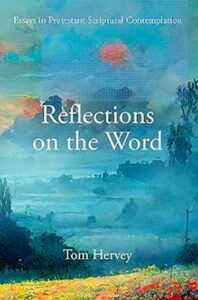 Tom Hervey’s book, Reflections on the Word: Essays in Protestant Scriptural Contemplation, 2023, addresses items of concern for Christians seeking to apply theology to their daily lives. The author is a member of Friendship Presbyterian Church in Laurens County, South Carolina, and fulfills his calling to subdue creation in the field of clinical engineering. The book’s cover is a lovely colorful painting of the sun rising over mountains as its warmth begins to dissipate the morning mist and the colors of the scene come to life, which may be intended to visualize the author’s contemplations coming to form. The theme verse for the book is Psalm 119:15,
Tom Hervey’s book, Reflections on the Word: Essays in Protestant Scriptural Contemplation, 2023, addresses items of concern for Christians seeking to apply theology to their daily lives. The author is a member of Friendship Presbyterian Church in Laurens County, South Carolina, and fulfills his calling to subdue creation in the field of clinical engineering. The book’s cover is a lovely colorful painting of the sun rising over mountains as its warmth begins to dissipate the morning mist and the colors of the scene come to life, which may be intended to visualize the author’s contemplations coming to form. The theme verse for the book is Psalm 119:15,
I will meditate on your precepts and fix my eyes on your ways.
Each chapter begins with a passage of Scripture from which the author draws his instruction. Some topics addressed are expected such as unbelief, self righteousness, and the current state of evangelicalism, but others speak to topics not commonly broached such as, the boldness of Christ drawn from Luke 13:32; an interesting presentation concerning the use of alcohol by magistrates interpreted from Proverbs 31:4-5; and in the spirit of John Calvin’s warning to exegetes not to go beyond what Scripture says is a chapter about learning with the light of revelation, not speculation. The book is available as an eBook, hardback, or paperback from the vendor named for the second longest river in the world (some contend it is the first longest). The prices are extraordinarily reasonable.
Now, some comments about a few chapters the reviewer found especially helpful.
The chapter, “A Good Example in the Matter of Cursing,” expresses the author’s concern that some professing believers have no qualms about using vulgar speech and some ministers fail to tame their tongues as well. He reminds readers that Colossians 4:6 instructs Christians to season their speech with salt so that no corrupting words come from their mouths (see also Ephesians 4:29). It could be added that instead of responding to cursing in like manner, responding with “A soft answer turns away wrath” (Proverbs 15:1).
Turning to 1 Corinthians 7:7 for “A Right View of Marriage,” the author comments that Rome’s error “is that it esteems celibacy too highly” but for Protestants “our own is often the opposite: we esteem singleness too lightly” (70). His observation exposes a legacy of the Reformation. In the sixteenth century the reformers critically reviewed the teaching of Rome about celibacy and rightly found it wanting. Both Luther and Calvin married not only in application of sola scriptura against celibacy, but also to show their freedom to do so simply because they were no longer governed by Rome. Does this legacy against celibacy influence Christians today to consider their single colleagues in the faith as second-class citizens of the kingdom of God? Hopefully not, but the author’s comment should cause reflection about how the married think of single believers. The author discusses other aspects of marriage in the chapter as well.
The vicissitudes of life are addressed in, “The Norm of Trouble in Light of 2020,” which considers political and social events including the corona virus and how they show the great expectations people sometimes have and how easily they are discouraged. When a wrench is thrown into the works, people are surprised that the mechanism of life does not work so well. The author expresses his thoughts convincingly.
If we expect ease and comfort, then we will inevitably be discouraged when hardship arises; and I hazard the guess that there is for many of us an inverse relationship between the two. So that the greater our normal comfort, the greater our displeasure when it is interrupted. (70)
He goes on to encourage his readers. The verse he refers to is Job 5:7, “Man is born of trouble as the sparks fly upward.”
Let us be diligent to always bear in mind the truth of this verse; that is, to expect difficulty rather than ease, averse circumstances rather than prosperous ones. (38)
Believers should understand that the world is what it is because of sin. Sin and the curse has affected every aspect of man and the rest of creation. However, why is it a surprise when wars, economic recessions, and disease rock the boat of ease and comfort? The author’s observations remind readers that the sin in Eden was yielding to the desire to be one’s own god. Knowing the theology of sin and the fall is necessary and good, but included with that knowledge is understanding that God governs His fallen world by providence which will not necessarily make things easy.
In conclusion, Tom Hervey’s Reflections on the Word is recommended reading for anyone wanting to learn what the Bible has to say about issues Christians face today. It could be used for personal reflection, in a study group, or even for casual conversations at the coffee shop (the author has a fondness for coffee) with unbelievers mystified by the problems they face as well as those confronting the nation and world. He has provided his thoughts through a balanced use of Old and New Testament passages.
The reviewer purchased the eBook copy read for this post.
Barry Waugh





